culture threat
For Christmas I gave my partner the new 30-GB video iPod she’d been romancing at the Apple store, and as a result I inherited her first-generation 10-GB iPod. I had played around with her old iPod before, once, on an airplane, while she was asleep and I was wide-awake and completely disinterested in watching Monster-in-Law. I had to admit that it was nice having a virtual record collection in the palm of my hand and, having thus far resisted the iPod juggernaut, I wondered whether I might like one after all.
Nevertheless, the old iPod has been sadly neglected since it came into my possession. (Actually, I've never really taken "possession" of it since I feel that I shouldn't profit from a gift I gave to my partner, so really she has two iPods, one of which she keeps trying to tell me is mine.) My pop-in-law gave me a $50 iTunes gift card to kick-start my digital library, but I haven’t yet visited the site. My partner thinks that I have trouble adapting to change, or that I simply resist the unfamiliar. But that’s not entirely true. I transitioned from LPs to CDs quite nicely.
I spent the better part of my youth, which by my calculation penetrated far into my 20s, hanging out in record stores. For nine of those years I actually worked in them, my first full-time gig being at the now-defunct Record Trading Center. As the name implied, RTC dealt in new and used records, though soon after I began working there we stocked our first CD: a Japanese import of the Beatles Abbey Road album. (Just in case anyone’s wondering, it’s OK to call a CD, or even a collection of music files meant to represent an artistic whole, an album. The term comes from the days when 78-rpm discs, which generally had just one song on each side, were sold in binders (or albums) that contained five or six discs comprising a cohesive collection. When 33-rpm LPs were introduced they retained the name, signifying not so much a format as a collection of music.)
While the compact disc took off in Asia, U.S. record companies were slower to embrace the new format. CDs were treated more as an audiophile novelty than a viable replacement to the LP. Most of the initial offerings were classical recordings, with only proven rock acts receiving CD treatment, and in those cases the disc releases lagged behind their LP counterparts by a number of weeks. Even then quantities were strictly allocated since manufacturing plants were scarce and their production was limited. As the price of CD players came down from thousands of dollars to hundreds, more and more customers clamored for the relatively small catalog of music available, with demand outstripping supply for the first year or so.
After I graduated high school I took a job as a buyer at an upstart store with a crazy business model: They would sell only CDs. I worked there for the next seven years, a witness to the CD revolution.
Now, just 20 years later, my friend J has gleefully announced to me, “We’ve decided to liquidate our CDs!” He and his wife have made three piles: music already transferred, music to be transferred, and music they no longer care about. When all their music is converted J figures they'll have only a handful of CDs worth keeping—those with sentimental meaning—otherwise they're going the way of so many dusty boxes of records before them.
I know I’m a dinosaur for liking the tangibility of CDs and LPs. (I still have a turntable, as well as a small collection of records that have never been released on CD.) I like to hold them and read their liner notes. I like madly searching through bins of used CDs at stores, hunting treasure, just as I used to dive into boxes of records at music swap meets.
I didn’t much mourn the passing of the LP. It had served us well for decades, but it also degraded with every revolution, filling its music with unintended pops and hiss that now sound as quaint to us as the key strikes of an old manual typewriter. I wasn’t even terribly concerned, as many record collectors were, with the loss of A and B sides as discrete sequences, with the B side of an album often kicking off with a song meant to set the tone for the second half. I figured that not having to split the album in two (with imposed time limits per side) would be more freeing to the artist, and back-catalog albums would still retain their original flow when released on CD.
My partner thinks I'm a snob for insisting that most serious artists intend that their albums be heard as carefully arranged sequences of music, the whole of which adds up to an artistic statement. It's this prejudice that causes me to announce, more frequently than my partner would like, that greatest-hits albums are for pussies. Sure, it’s an overstatement—and I have a number of best-of and greatest-hits albums myself—but I do prefer the listening experience, and sometimes even the challenge, of music in its original context. I think it puts us closer to the artist's soul. And I know that iTunes offers complete-album downloads, but I can't help feeling that the album as a concept is in trouble.
Also in danger: album art.
As much as I love music, I also adore its ephemera. I used to decorate my room, and later my apartment, with promotional posters, album covers, and 45 sleeves I found meaningful, interesting, or flat-out strange. There were times when my living space resembled one of the rare record haunts I’d seek out in far-flung places, where the clerk/owner seemed disinterested in actually selling anything, regarding his collection more as a museum than a store. I still have hundreds of promotional posters from my music retailing days, brought home because I couldn’t bear to throw them out. I still can’t.
I know there are Web sites dedicated to downloadable album art for display on the iPod, but the iPod users I know don’t seem particularly interested in covers or liner notes. That said, I offer the following visual reminders of why album art is essential to our culture:

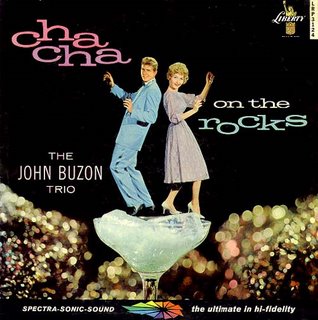


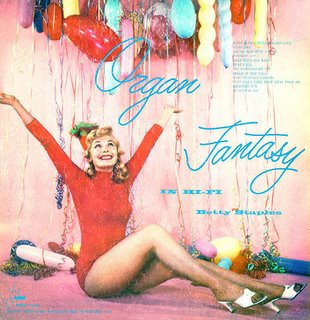
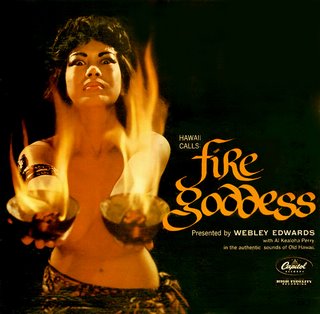
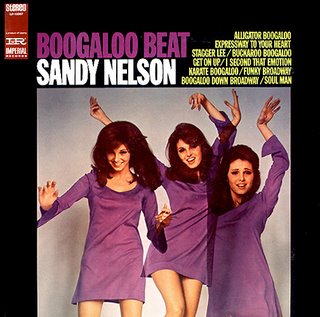
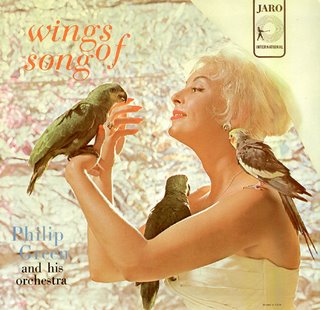
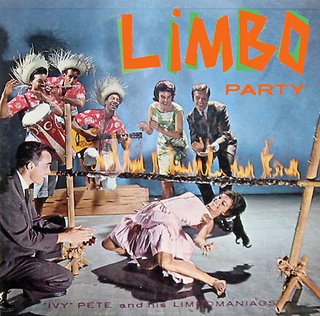
Save the album cover!
Nevertheless, the old iPod has been sadly neglected since it came into my possession. (Actually, I've never really taken "possession" of it since I feel that I shouldn't profit from a gift I gave to my partner, so really she has two iPods, one of which she keeps trying to tell me is mine.) My pop-in-law gave me a $50 iTunes gift card to kick-start my digital library, but I haven’t yet visited the site. My partner thinks that I have trouble adapting to change, or that I simply resist the unfamiliar. But that’s not entirely true. I transitioned from LPs to CDs quite nicely.
I spent the better part of my youth, which by my calculation penetrated far into my 20s, hanging out in record stores. For nine of those years I actually worked in them, my first full-time gig being at the now-defunct Record Trading Center. As the name implied, RTC dealt in new and used records, though soon after I began working there we stocked our first CD: a Japanese import of the Beatles Abbey Road album. (Just in case anyone’s wondering, it’s OK to call a CD, or even a collection of music files meant to represent an artistic whole, an album. The term comes from the days when 78-rpm discs, which generally had just one song on each side, were sold in binders (or albums) that contained five or six discs comprising a cohesive collection. When 33-rpm LPs were introduced they retained the name, signifying not so much a format as a collection of music.)
While the compact disc took off in Asia, U.S. record companies were slower to embrace the new format. CDs were treated more as an audiophile novelty than a viable replacement to the LP. Most of the initial offerings were classical recordings, with only proven rock acts receiving CD treatment, and in those cases the disc releases lagged behind their LP counterparts by a number of weeks. Even then quantities were strictly allocated since manufacturing plants were scarce and their production was limited. As the price of CD players came down from thousands of dollars to hundreds, more and more customers clamored for the relatively small catalog of music available, with demand outstripping supply for the first year or so.
After I graduated high school I took a job as a buyer at an upstart store with a crazy business model: They would sell only CDs. I worked there for the next seven years, a witness to the CD revolution.
Now, just 20 years later, my friend J has gleefully announced to me, “We’ve decided to liquidate our CDs!” He and his wife have made three piles: music already transferred, music to be transferred, and music they no longer care about. When all their music is converted J figures they'll have only a handful of CDs worth keeping—those with sentimental meaning—otherwise they're going the way of so many dusty boxes of records before them.
I know I’m a dinosaur for liking the tangibility of CDs and LPs. (I still have a turntable, as well as a small collection of records that have never been released on CD.) I like to hold them and read their liner notes. I like madly searching through bins of used CDs at stores, hunting treasure, just as I used to dive into boxes of records at music swap meets.
I didn’t much mourn the passing of the LP. It had served us well for decades, but it also degraded with every revolution, filling its music with unintended pops and hiss that now sound as quaint to us as the key strikes of an old manual typewriter. I wasn’t even terribly concerned, as many record collectors were, with the loss of A and B sides as discrete sequences, with the B side of an album often kicking off with a song meant to set the tone for the second half. I figured that not having to split the album in two (with imposed time limits per side) would be more freeing to the artist, and back-catalog albums would still retain their original flow when released on CD.
My partner thinks I'm a snob for insisting that most serious artists intend that their albums be heard as carefully arranged sequences of music, the whole of which adds up to an artistic statement. It's this prejudice that causes me to announce, more frequently than my partner would like, that greatest-hits albums are for pussies. Sure, it’s an overstatement—and I have a number of best-of and greatest-hits albums myself—but I do prefer the listening experience, and sometimes even the challenge, of music in its original context. I think it puts us closer to the artist's soul. And I know that iTunes offers complete-album downloads, but I can't help feeling that the album as a concept is in trouble.
Also in danger: album art.
As much as I love music, I also adore its ephemera. I used to decorate my room, and later my apartment, with promotional posters, album covers, and 45 sleeves I found meaningful, interesting, or flat-out strange. There were times when my living space resembled one of the rare record haunts I’d seek out in far-flung places, where the clerk/owner seemed disinterested in actually selling anything, regarding his collection more as a museum than a store. I still have hundreds of promotional posters from my music retailing days, brought home because I couldn’t bear to throw them out. I still can’t.
I know there are Web sites dedicated to downloadable album art for display on the iPod, but the iPod users I know don’t seem particularly interested in covers or liner notes. That said, I offer the following visual reminders of why album art is essential to our culture:









Save the album cover!

5 Comments:
Hmm. I like albums. I also like my ipod and my ability to make weird-ass mixes by buying Hollaback Girl and Do You Know the Way to San Jose one after the other so that they're forever linked in my ipod's mind. At any rate, if you don't want that gift card, I'll buy it off you. I've burned through mine.
I agree that albums *were* (at least) created/intended as a collective whole. Carefully chosen songs, in a particular order, all that. I don't know that modern albums are still that way, exactly. And I'd wager there have been plenty of times that artists and their producers just pulled together what was best/what they had already recorded, and the album as a whole was a more serendipitous creation than an intended one. I'd also wager that there are plenty of artists today who are more "vague" about it, since they are fully aware that the individual songs will be pulled apart and "re-aggragated" into an individual listener's collection; they may never be heard in their original album context, since so much is released for download in singular form.
I think it just creates more flexibility, and gives folks (like Sporksforall) the opportunity to create their own meaningful collections. After all, people have always been able to take albums, pull out pieces and do the mix-tape thing, which is just an earlier version of the iPod thing we do now.
I guess I look at it like I would viewing a painting. The painter may have intended a particular message/feeling (or not); the critics and *knowledgeable* people can write and discuss what we're supposed to take from it, but in the end, I'll look at the painting and find my own meaning.
Reactions to music (all art) are, imho, intensely personal, and we'll do with them what we will.
I'll add that the one thing I don't like about CDs is that the album cover art got a lot smaller, because I like cover art and liner notes and all that business quite a bit, myself. ;)
And I sort of like the pops and crackles of vinyl. The ones at the beginning of each side always sounded like "anticipation" to me, especially when the album was brand new.
I have a turntable that died when I wasn't looking -- I think it needs a couple of replacement parts, and I haven't had the time to find a turntable-repair store -- there must be one, somewhere near me.
There are a couple of distinct resons I prefer the LP to the CD: as you mentioned, the cover art; then there are the album sleeves that had all the lyrics in a type point size one could read, and some of those lovely inserts and handbooks that simply won't fit into CD-size squares.
I resent terribly needing to replace my past repackaged into a new format, and as a baby boomer whose hands don't have the dexderity they once did, I resent the CD packaging.
I hate the inevitable fight with CD jewel-box theft-prevention so-called peel-and-remove stuck-on wrappers. Removing the sealed-at-the-factory theft-protection is beyond the call. (My friends with arthritic hands agree.) I get CDs through mail order: exactly who is going to steal that CD when it doesn't hit retail shelves?
And the late, lamented LP? I grew up at a time when the double album came in very handy to de-seed one's marijuana purchase. What do the youth of America do now? Has pot smoking declined so drammatically in the past 25 years, or has the quality improved to the point where the seeds are no longer an issue? My last field experience was 1978, and I'm sure much has changed in that particular arena, but still, those double albums remind me of a time when, as the song said, "everybody must get stoned." And we did.
What, no audiophile has yet to turn up here with the comment that CDs sound "cold" compared to the analog "warmth" of vinyl?
My take: Once everything turned digital, it was only a matter of time before the concept of albums became passe for a lot of people. But then again, these are the same kinds of people that never listened to the whole LP or CD anyway. People who listen to "Top 40" radio, for example, are rarely interested in listening to the non-hits, whether because they don't have the ear, desire, or just simply the time to devote to listening to songs they don't already know. We're actually returning (regressing?) to the time before the LP existed, when songs were the prime focus of music making and listening. In addition, some artists are embracing this move, some not. All are seeing the market shift to the Web, however, along with the loss of aural quality there due to the compression of the digital file, and that is the real shame, imho. It's like we're throwing away all our stereo equipment in favor of the 3 1/2" mono speakers that used to adorn all car radios . . .
By the way, I think you should embrace your iPod; think of it not as a hand-me-down, but a (very) cheaply won eBay auction item!
Post a Comment
<< Home